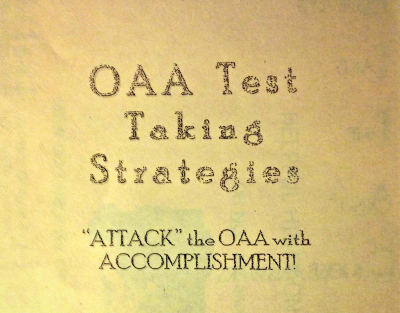Today is a big day for third graders at our school, and all third graders in our district. It’s Test Day. I don’t mean a normal spelling test or math test, but the BIG test for them. The OAA third grade achievement test. The district already puts an enormous emphasis on this test already, since it influences each school’s state report card, but a new state policy called the Third Grade Reading Guarantee will this year automatically hold back any students who don’t pass the test.
That’s a lot of pressure for eight and nine year olds over a single test.
Last month, the papers starting coming home about this test. The kids have been working on practice tests and focusing on homework that develops their answers to match what is wanted for the test. I won’t even get started on how maddening the Common Core standards are, especially for a child who can’t show her work because there was no work to show – her brain just moves that fast to the answer.
Cordy did well on the practice test. They said she was finished with it before all of the kids had even received their tests, and despite zipping through it at breakneck speed, nearly all of the answers were correct. That gave me hope that she’ll do well on the real test.
This may solidify my status as strange, but I’ll admit I loved taking standardized tests as a kid. It was a game to me – a challenge to prove I could beat the test and show how smart I was. School was maddeningly boring for me. I spent most days reading ahead in all of my textbooks, starting assignments before the teacher was done explaining the lesson, and getting a pass to go to the library when I finished my work ahead of everyone else so I could browse what books I wanted to read next. From second to fifth grade, I spent one day a week entirely in a gifted ed classroom, and that was the only thing that kept me from giving up on school entirely.
But whenever we had a standardized test, with its little scan-tron bubbles to fill in with pencil, I got excited. After all, it was my first standardized test in first grade that led to me being placed in the gifted ed program, so I saw these tests as a chance to earn something by showing them I didn’t belong in my current class.
As soon as my teacher said “Go,” I flipped open the first page of the book with excitement, knowing the first few questions were always the easy ones and wanting to move past them as quickly as possible. I never went back to check my answers – I’d carefully check that the answer I chose matched up with the bubble on the scan-tron, make sure it was filled in completely, and then didn’t look back.
I did feel some pressure, but it was all internal. I was competing against myself, and no one else knew it, which made it all the more fun. But the scores didn’t really count for much. The teachers didn’t have any pressure, either – these were nothing but aptitude tests, and no district report cards were hanging in the balance. Back then, the districts knew there was more to each student than just a test score, and there was more for a student to learn than just the test materials and test strategy. I happened to be good at these tests. Other kids had different strengths, and those strengths were valued in the classroom, too. (If anything, my strengths were not all that valued.)
Sadly, there were no rewards beyond the first grade test. I never got to skip a grade, and no black car pulled up to the school to take me to a more interesting school. I still enjoyed seeing my accomplishments on the tests, though. I’d never be talented in sports, but I could pull 97th percentile and higher scores in all standardized tests, so that was my source of pride.
Cordy has had similar reactions to standardized tests so far. When she was given the IQ assessment earlier this year, the psychologist remarked that she seemed to be having fun with the test, even showing pride when she realized she was doing better than expected.
But the build-up to this test has been hard on her in the past two weeks. Test taking strategies are being taught, and the kids brought home a Test Pledge that we had to review with them and sign together. This pledge included such things as “I’ll get a good night’s sleep the night before the test,” (of course you will, with that much pressure on you!) and “I’ll carefully read the entire passage before answering questions.”
Papers came home for parents, too, urging us to make sure the kids went to bed early on Monday night and had a good breakfast this morning. If we couldn’t provide breakfast, they reminded us that free breakfast was available for all students before the start of school. And, of course, there’s this tip: “Remind your child that your love does not depend on how well he or she scores on the test.” Gah! Really? People really put that much pressure on kids?
Damn, even I’m feeling anxious about this test now, and I’m not the one taking it.
It’s no surprise, then, that in the past few days Cordy has become increasingly anxious about this test. Last night, she started to panic at bedtime, saying she was worried about the test. “What if my teacher isn’t there? What if there are questions I don’t know? What if there are 400 questions and I get too tired to answer them all?” she asked.
Aaron and I tried to soothe her worries, reminding her that our definition of doing well on the test means staying focused and trying her best. If she did that, then she did well on the test for us and we’ll be so incredibly proud of her, regardless of her score.
I also tried to get her back into feeling confident: “But Cordy, you have no reason to worry, because I know a secret about this test.”
“What is it, mama?”
“This test? It’s only testing you on third grade material.”
“So?” she replied, curious as to why that mattered.
“So,” I explained, “you have nothing to worry about, because you know WAY more than third grade stuff!”
It made her smile, which was a victory in my mind. She then tried to compare the test to a Skylanders battle, and I went along with it. Whatever it takes to make her feel better.
It also disheartens me to see so much of what is taught directed towards The Test. And now, with the state basing all decisions on holding a child back in third grade on this assessment, it’s more important than ever. A child’s entire third grade experience is more than a score on a standardized test. The test puts too much pressure on the kids and the teachers to perform for this single day event, with future performance for both groups linked to these scores.
I truly appreciate the teachers in my daughters’ lives. They have talent and passion for what they do, and I wish they had greater freedom to teach their students without the test pressure. So much gets left behind when you’re stuck hammering home key points and strategies for The Test.
I’m hoping Cordy does her best today, and that she somehow finds a way to enjoy this test.




That is the most ludicrous thing I have ever heard. As an educator, I bang my head against a brick wall already with what my country expects. Now I’m finding myself just extremely glad that I don’t yet live in a society where one test can make or break a child’s social and emotional well-being, not to mention their academic progress! So much for individuality. It really is becoming a case of ‘fit the mold or we’ll just pummel you until you do.’ Crossing all my fingers and toes that Cordy wowed them!
I absolutely HATE teaching to test. That’s not really teaching kids anything that will stick with them or be valuable in their lives. I am very glad that in MN we booted NCLB and what we do is test the kids and the beginning of the year (MAP test) and the end of the year and show how much both he cohort and the individual kid has gained. Makes so much more sense!!! Best of luck to all the kids !